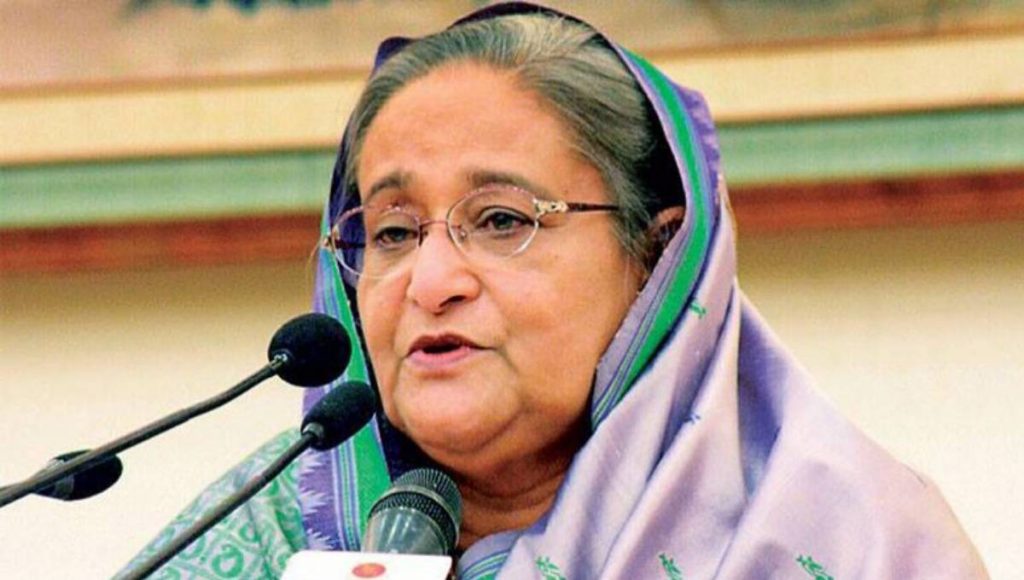New Delhi, Oct 3 (UNB) – Prime Minister Sheikh Hasina on Thursday urged the global investors, particularly the Indian entrepreneurs, to invest in non-conventional potential areas.
“It’s time for global investors, particularly the Indian entrepreneurs, to invest in Bangladesh in areas like education, light-engineering, electronics, automotive industry, artificial Intelligence — beyond the conventional menu,” she said.
The Prime Minister made the call while addressing as the chief guest at the Country Strategy Dialogue (CSD) on Bangladesh at the India Economic Summit 2019 of the World Economic Forum (WEF) at Hotel Taj Palace in the capital city of India.
Hasina said Bangladesh is moving fast to a high-value, knowledge-intensive society, beyond apparel manufacturing.
Last year, she said, Bangladesh exported 12 industrial robots to Korea while four ships made in Bangladesh have come to India.
Recently, Reliance purchased a large quantity of refrigerators made in Bangladesh and Bangladesh also has six lakhs of IT freelancers – the largest freelancing community, Hasina said.
“Today, Bangladesh offers the most liberal investment regime in South Asia – in terms of legal protection of foreign investment, generous fiscal incentives, concession on machinery import, unrestricted exit policy, full repatriation of dividend and capital on exit, for example,” Hasina said adding Bangladesh is establishing 100 Special Economic Zones, with one-stop service across the country.
She said 12 such Zones are already functioning while two are reserved for Indian investors.
A number of High-Tech parks are also ready for technology and innovative enterprises, the Prime Minister mentioned.
In between Eastern and North-East India, China on the west and South-East Asia, Bangladesh deserves the attention of global and Indian business as a seamless economic space, said Hasina.
“We can serve as the economic hub for the sub-region. Beyond our own 162 million people, Bangladesh can be the connecting landmass to a combined market of nearly 3 billion people,” she said.
Last year, the Prime Minister said, HSBC predicted that Bangladesh will be the 26th largest economy in the World by 2030.
She said two things are key — open society (in Bangladesh), religious harmony, liberal values, secular culture and the other is that two-thirds of its homogenous population is young – mostly under 25.
They are fast skill-able, adaptive to technologies, ready to engage in competitive wages, Hasina said.
“Many see Bangladesh as ‘a market’ of over 30 million middle- and affluent-class population and a ‘development miracle’. To me, our strengths are the societal values and people’s trust in Bangladesh. Equally, people’s aspiration to progress and their resilience as well as their confidence in our leadership,” she said.
The Prime Minister said Bangladesh is urbanising fast and by 2030, about 48 percent of our population will live in towns and cities.
“Most of them will be young, energetic and digitally connected. They will be agile, receptive to new ideas and look for new ways of creating wealth,” she said.
In fact, Hasina said, this is already happening with over 110 million active internet subscribers in Bangladesh. By 2025, mobile internet penetration will reach 41 percent population.
“Rapid urbanisation fed by increasing consumption of electricity and over a 30-million middle class is indeed a huge market,” she said.
“We’ve challenges like many other countries but we know how to transform challenges into opportunities,” the Prime Minister said.
This year, the economy of Bangladesh posted a record high growth of 8.1 percent in the last fiscal year.
“We’re close to achieving double digit growth. Since 2009, Bangladesh economy has grown by 188 percent in size. Our per capita income is around US$ 2000,” she said.
Hasina said agriculture is no longer a subsistence one in Bangladesh. “Beyond self-sufficiency, we’re now the 4th largest in rice production, 2nd in jute, 4th in mango, 5th in vegetable production and 4th in inland fisheries, in the world. We’re decoding genome of key crops and fruits to move further.”
In transforming the country into a `Digital Bangladesh’ since 2009, Bangladesh have ensured 100 percent ICT access for people at the grassroots, she said adding that her government’s focus is to employ technology to solve common people’s developmental challenges.
“As a result, Bangladesh has the 5th largest internet user population in the Asia-Pacific. We’re moving fast towards a cashless society. Last year, e-commerce transactions reached 260 million dollars,” she said.
Hasina said Bangladesh is continuously learning in its journey to development with its confident people, able leadership and governance. Bangladesh offers you a stable and humanitarian state, where leadership is responsive and responsible.
That is coupled with sound macro-economic fundamentals, pragmatic and open economy shall continue to set global trends and examples of a peaceful and progressive nation, she said.
PM’s Private Industry and Investment adviser Salman F Rahman depicted the investment-friendly climate prevailing in Bangladesh.
The WEF leaders, including its president Borge Brende, highly praised Sheikh Hasina for her leadership in the economic development of Bangladesh.
They said Bangladesh earned a remarkable GDP growth over the past years.




